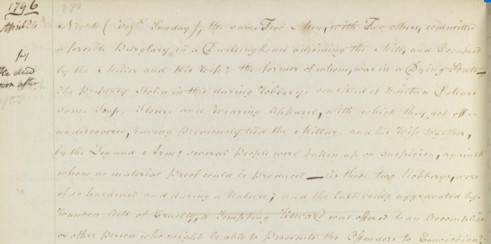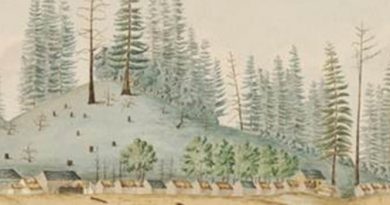James Tucker: Norfolk Island Hangman
James Tucker was Norfolk Island’s hangman from 1796 until his death in 1807. But how did he become the Norfolk Island hangman?
James TUCKER, convict Neptune 1790. Crime: Steal a silver teaspoon & a part of a linen shirt. Tried: Old Bailey, 10 September 1788. Sentence: 7 years transportation. James arrived on Norfolk Island aboard the Mary Ann in August 1791. He formed a relation with Elizabeth COLE Convict Lady Penrhyn Crime: Break, enter & steal a woman’s gown & other goods. Tried: Exeter, 20 March 1786. Sentence: 7 years transportation. Transferred from the hulk to the Charlotte on 11 March 1787, age 27 years. In Aug 1787 she was transferred to the Friendship at Rio. In October 1787 she again was transferred, this time to the Lady Penrhyn for the final leg of her voyage to NSW.
In late April 1796 Norfolk Island Commandant, Philip Gidley King wrote that “for some time past few no robberies have been committed, until the arrival of the convicts that escaped from Port Jackson, in the Endeavour, and those lately arrived by the Supply, who are, for the most part, a hardened set of wretches”. The convict stowaways from the Endeavour shipwreck arrived on Norfolk Island in January 1796, with Supply (2) arriving on 6 April 1796.
“Two of the above description (as it has since appeared) broke open a settler’s house and robbed it of a quantity of meat and wearing apparel. As this robbery passed undetected, on the following night the same two men, with two others, committed a forcible burglary in a dwelling house adjoining the mill, and occupied by the miller and his wife, the former of whom was in a dying state [side note by King; he died soon after]. The property stolen in this daring robbery consisted of nineteen dollars, some soap, flour and wearing apparel, with which they got off undiscovered, having previously tied the miller and his wife together by the leg and arm. Several people were taken up on suspicion against whom no material proof could be produced. As those two robberies were of so hardened and daring nature, and the last being aggravated by wanton acts of cruelty, a tempting reward was offered to an accomplice or other person who might be able to prosecute the offenders to conviction. The reward consisted of a free emancipation and a passage to the Cape of Good Hope, when either of His Majesty’s ships might be going, provided an intercourse should take place with Port Jackson before their departure. Also five gallons of spirits, three suits of slop cloathing and a choice of three hogs and one lamb from government stock. Tempting as this reward might appear to be it did not produce a discovery until the additional reward of twenty Dollars was offered, when a confidant of the gang (and perhaps on other occasions one of them) made a full discovery four days after the robbery was committed”.
“The gang consisting of four were immediately apprehended and confined in the jail and guardhouse, and a criminal court was directed to assemble. One of the gang was allowed to become an evidence against his companions, whose evidence with that already procured, fixed the guilt so very clearly that the court were unanimous in pronouncing them guilty; when the Judge Advocate pronounced sentence of death on the three delinquents only one of them at this time confessed the fact”.
In order to make that example as striking as possible, to prevent a repetition of those enormous crimes, King ordered their death sentence to be carried into execution the evening of their condemnation. As this was the first punishment of the kind that has taken place on Norfolk Island King felt it became necessary to pardon James Tucker on condition of him remaining here for life and performing the office of a public executioner, which he thankfully accepted. The second man was also pardoned on the condition of him remaining on Norfolk Island “during the natural term of his life.”
So only one man remained to be executed, King wrote that he “suffered with much contrition and a thorough sense of his guilt, and I sincerely hope that the effect this first execution seemed to have on every person will put a stop to those enormous crimes and remove the necessity of any more examples being made”. Dennis Mohair was executed 2 May 1796, his time on Norfolk Island had been shorted lived, arriving in January 1796 being a stowaway convict from the Endeavour shipwreck.
James Tucker died 3 December 1807 Norfolk Island, age 50 years.
References:
Dunn, Cathy. Norfolk Island Rev. Fulton baptisms, burials and marriages 1801 – 1806
King, Philip Gidley. Journal of Philip Gidley King 1791 – 1796, NLA, MS 70.
UNE Department of Archaeology, Classics and History, Directory of the Norfolk Island First Settlement 1788-1814



